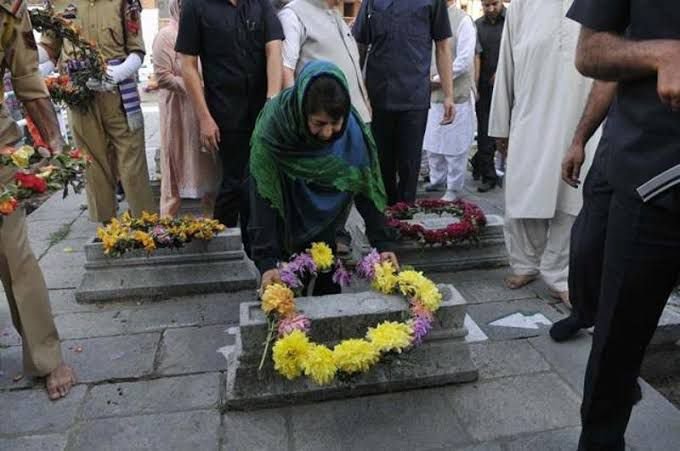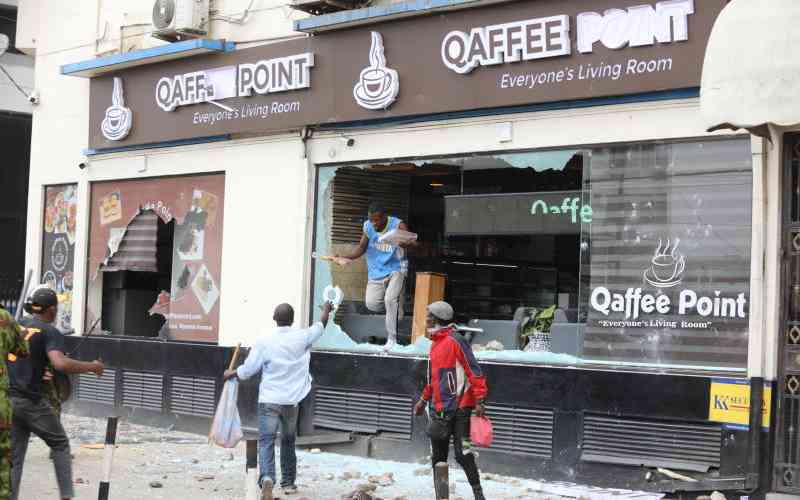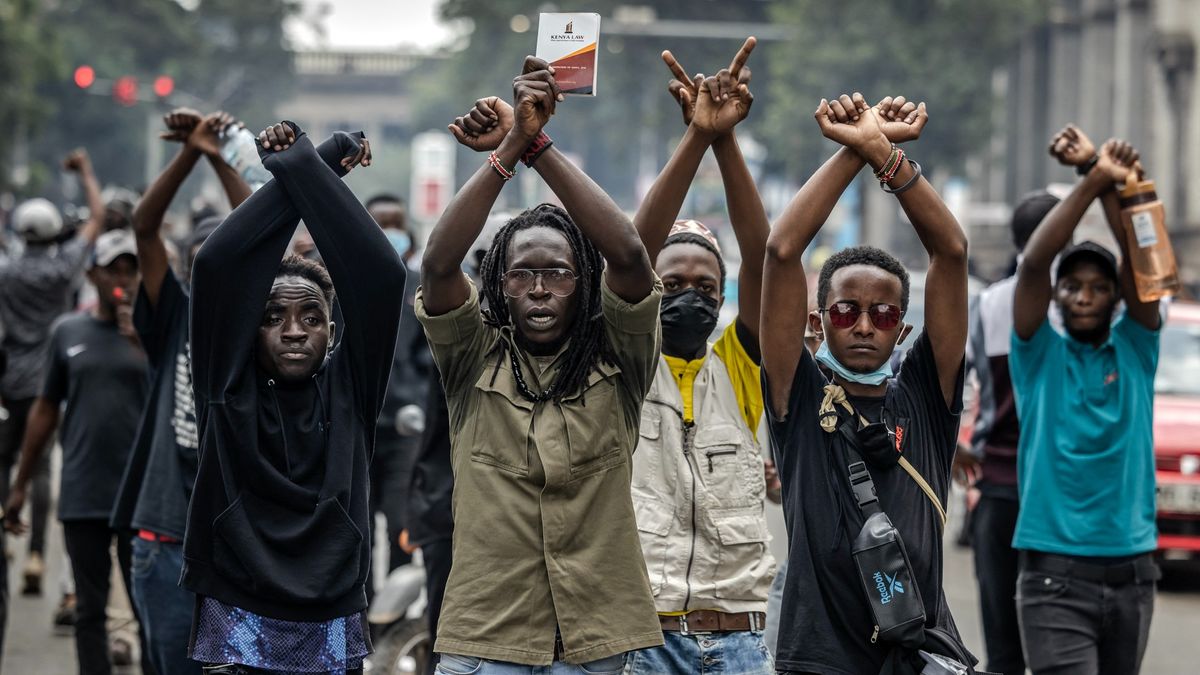






Generation Z in Kenya organized a concert at Uhuru Park in Nairobi to honor their fallen peers in the anti-tax protests. The event, called the Shujaaz Memorial Concert, served as a tribute and a rallying cry for justice and democracy in the country. The concert, which ran from 12 pm to 7 pm, aimed to reignite the spirit of the historic Saba Saba movement from the 1990s [837fe89a].
On July 8, 2024, youth gathered at Holy Family Basilica in Nairobi for a service in remembrance of those who died during the protests. The solemn event provided an opportunity for the community to come together and honor the lives lost during the demonstrations. The gathering at Holy Family Basilica complemented the concert at Uhuru Park, both serving as powerful expressions of solidarity and a call for justice [e09036b8].
Njeru Kathangu, one of the original planners of the Saba Saba movement, compared the current state of activism in Kenya to that of 1990, highlighting the greed of leaders, impunity, and creeping repression and dictatorship. The International Commission of Jurists (ICJ) expressed concern about the government's repressive tactics, including arbitrary arrests and the use of excessive force, which they say is reminiscent of the regime of President Daniel arap Moi. Human rights activists called for accountability and reforms, urging the government to cease the use of violence against protesters and respect the constitutional rights of freedom of expression and assembly. The Kenya Human Rights Commission (KHRC) called on Kenyans to come out in large numbers to honor those who stood up against the finance bill and fight for justice for those who lost their lives [837fe89a].
Despite the government's withdrawal of the tax increases, the youth-led movement in Kenya continues to call for justice and reforms. The protests have highlighted the growing concerns over economic challenges, debt burden, and the violent crackdown by the government. Kenya is classified by the International Monetary Fund (IMF) as being at high risk of debt distress, and the heavy debt burden has strained the government's finances, hindering its ability to address the needs of its people. The protests serve as a wake-up call for the urgent need for economic reforms in the country [2d4b64db] [73e19e3f].
The situation in Kenya reflects a larger concern for the future of Africa, as the continent is projected to have a significant youth population by 2035. The conditions for further youth-led unrest are growing, and the protests in Kenya could potentially inspire similar movements across the continent. This youth-led movement challenges the traditional notion of protests being led by the elite, signaling a shift in the dynamics of social and political activism in the country [2d4b64db] [73e19e3f].
During the anti-tax protests in Coast, Kenya, on July 2, 2024, the protests were infiltrated by armed goons who unleashed terror, stabbing and robbing locals and tourists in the presence of police officers. The anarchy was planned in plain sight, with the owner of Qaffee Point Restaurant in Mombasa, where the attacks took place, being pictured with President William Ruto and other party officials. The attacks were preceded by the raid of the offices of the Registrar of Persons, where identification documents were stolen. The protests started peacefully but turned chaotic when unfamiliar faces joined the march. The goons arrived in Mombasa's CBD riding motorcycles and infiltrated the protests by posing as well-wishers distributing water. The police stood aside and watched as the attacks unfolded, leading to public anger and criticism of their inaction. Thirteen suspects were arraigned in court for the attacks, and it was revealed that the knife-wielding gangs were members of criminal gangs ferried from different areas. The police were accused of being reluctant to stop the goons and were criticized for suppressing divergent views during peaceful protests. The conduct of the police during the protests pushed the country to the precipice of anarchy, according to the Council of Imams and Preachers Kenya (CIPK). Muslim clerics called on the youth to shelve plans for further protests to avoid deaths and injuries [941dc7b4].
India has issued an advisory for its nationals in Kenya to exercise caution and avoid areas affected by the protests and violence [73e19e3f].
Kenyans from all walks of life gathered at Uhuru Park to celebrate the lives of patriots who died while fighting for change in the country. The Shujaaz Memorial Concert was attended by activists, celebrities, Gen Zs, and people from older generations, as well as the families of the fallen protesters. Performances were given by Juliani, Bien, and spoken word artists. Celebrities such as Nameless, Larry Madowo, Edith Kimani, Boniface Mwangi, and Okiya Omtata were also in attendance. The event featured moments of reflection, activists honoring the fallen, and mock graves of the dead patriots. Kenyans of Indian descent and parents with their children were also present. The concert was peaceful, with no cases of violence reported. In another story, a young woman named Mercy Kamanthe was seen protesting the Finance Bill 2024 and went live on Al-Jazeera. Safaricom PLC announced a contribution of KSh 50 million to support individuals affected by the recent protests against the Finance Bill.
Hakeem Muhhammad Yaseen, Chairman of Jammu & Kashmir Peoples Democratic Front (J&K PDF), paid tribute to the martyrs of 13 July, 1931, who sacrificed their lives for the rights of Kashmiris. He emphasized the importance of protecting the constitutional and democratic rights of the people and called for self-introspection and serving the people of Jammu and Kashmir. Hakeem urged political and social organizations to follow the path of the July 13 martyrs and work towards filling the socio-political vacuum in the region. He advocated for a sustained struggle to restore democratic and constitutional rights through peaceful means, dialogue, and reconciliation. Former Chief Minister and President of the People’s Democratic Party (PDP), Mehbooba Mufti, also paid tribute to the martyrs of July 1931 in Jammu and Kashmir. The martyrs are remembered for their struggle against tyranny and fight for justice during the oppressive rule of the Maharaja. Mufti emphasizes the enduring significance of the martyrs in the collective memory of Jammu and Kashmir. She calls for continued vigilance and dedication to democracy, human rights, and social justice. Mufti urges unity and resilience among the people of Jammu and Kashmir, drawing inspiration from the martyrs' legacy. The People’s Democratic Party pledges to uphold the martyrs' legacy and continue the struggle for justice and dignity in the region [1fb18dc4].